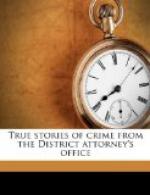Thursday morning Mr. Baker and F. A. Rice, the brother of the deceased, arrived in New York. Patrick showed them the cremation letter, and, inasmuch as they took a neutral position in the matter, ordered the cremation to proceed, and accordingly it took place that very day. He also endeavored to win the confidence of Baker, but succeeded in accomplishing little. He finally gave the latter a copy of the 1900 will and the original will of 1896. He also informed Baker that he had taken a large number of papers from Rice’s apartments, and turned over to him a considerable number of them. He also surrendered on Friday the two Swenson checks.
After considerable discussion Baker told Patrick flatly that he would never consent to the probate of the 1900 will; that he was satisfied that the ’96 will was the last will of Rice, and that he would insist upon its being probated, to which Patrick replied, that so far as he was concerned he did not know but that the probate of the ’96 will would suit him just as well as the probate of the 1900 will; that it was a matter of indifference to him, and that so far as the Rice Institute was concerned he was prepared to give Baker from three to five million dollars for it, or any other sum Baker might name. These negotiations and conferences continued until the fourth of October, Patrick yielding step by step, until he had divested himself of all control of the documents and securities.
Meantime sufficient evidence having been secured, Patrick and Jones were arrested on a charge of forgery and held for the Grand Jury. Bail was fixed at ten thousand dollars each, but was not forthcoming.




